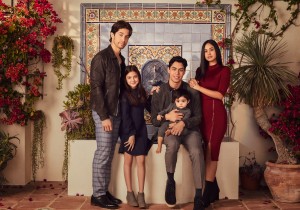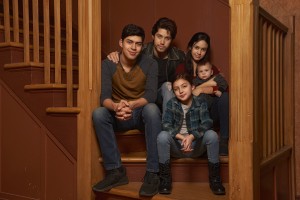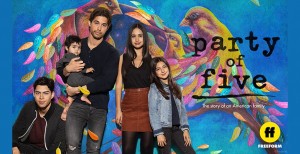The original PARTY OF FIVE ran for six seasons, 1994 through 2000, on the Fox Network. Created by Christopher Keyser & Amy Lippman, the series about the five suddenly orphaned young Salinger siblings making their way through the world launched the careers of leads Neve Campbell, Lacey Chabert, Matthew Fox, Jennifer Love Hewitt, and Scott Wolf.
Now, twenty-five years after the first version launched and two decades after it ended, Lippman & Keyser have reinvented PARTY OF FIVE. Instead of the white Salinger clan, we now have the Latinx-American Acosta family: eldest Emilio (Brandon Larracuente), twins Lucia (Emily Tosta) and Beto (Niko Guardado), Valentina (Elle Paris Legaspi), baby Rafa, restaurant owner father Javier (Bruno Bichir), and mother Gloria (Fernanda Urrejola). The clan is living more or less happily in Los Angeles, though Javier wishes Emilio would pay less attention to his music and more attention to the restaurant. Then ICE sweeps up Javier and Gloria, who have been tax-paying, hard-working Californians for the past twenty-three years. Despite impassioned pleas (and an expensive lawyer), the elder Acostas are deported to Mexico, leaving their stunned children trying to figure out what to do next, and how to support one another emotionally and financially.

Brandon Larracuente as Emilio Acosta, Elle Paris Legaspi as Valentina Acosta, Niko Guardado as Beto Acosta and Emily Tosta as Lucia Acosta in PARTY OF FIVE – Season 1 | ©2019 Freeform/Nino Munoz
The new PARTY OF FIVE airs Wednesday nights on Freeform. Lippman says that one of the primary differences between the first and second editions of PARTY OF FIVE is that, “When we looked a the Salinger family in the 1990s, they were having an experience that was really unique, and it was their own, and they didn’t have a lot of people who could relate to it. And I think one of the things that we’re doing with this go-round is, it’s an experience that is not unique to them.” Children coping with the sudden deportation of parents is “happening across the country. So there is the sense that they are not alone in their experience of having to raise themselves.”
Lippman and co-executive producer/writer Gabriel Llanas sit down to talk about their new PARTY.
Lippman begins by introducing Llanas.
AMY LIPPMAN: Gabe is part of this writing staff that I brought on, who in every way sort of has informed what the story is, because it’s a room of people who are much closer to the experience of this family than I am personally.
ASSIGNMENT X: Although he’s not involved in writing the new version, Norman Lear is executive-producing a reboot of his ‘70s series ONE DAY AT A TIME. The early one was about a white family, the new version, which is going into its fourth season, is about Cuban-Americans. Were you inspired at all by that?
LIPPMAN: You know something? I would imagine, if you look back on it, these projects happened concurrently. So I wasn’t watching that show to think about this, although it’s probably not a coincidence that we are both at Sony. We’re both Sony reboots, and I think Sony was very receptive to taking that [PARTY OF FIVE] IP [intellectual property] out and repurposing it, based on the experiences they had with ONE DAY AT A TIME.
AX: Do both of you feel that, because the Latinx population overall is so much larger than it was in the ‘70s, there is now a greater audience demand for shows speaking to the Latinx-American experience?
LIPPMAN: Well, I think the situation that the show is based around is not unique. It is something that’s in the zeitgeist, it’s something that’s on the front page of newspapers, and I’m delighted to see that there are more diverse stories that are being told now, and it’s important that they’re told not by people like myself [Lippman is white], who are sort of appropriating stories, but they are providing opportunities for other people to actually tell stories that are very close to them. So I think the Latin audience is important. I would love them to be able to watch it. We didn’t do a show only to appeal to that audience.
GABRIEL LLANAS: Yeah, I would definitely say that the population being what it is, the show isn’t specifically tailored for the Latinx audience. It’s for a broad audience, it’s for anyone who’s interested in this kind of heartbreaking event that might have happened, and what the aftermath is, and the courage that it takes for those kids to carry on afterwards, and what the parents have to deal with as well. And I think it’s interesting that people have an idea that, because the population is up, we should produce content that’s specifically for that population or that demographic, when I feel like, you kind of never know where you’re going to hit with a population or a certain demographic. And the answer is, if you’re creating a good product, if you’re doing solid emotional storytelling about an interesting story that feels present, that feels it can resonate beyond the screen into what’s actually happening in the world, those are the types of things that catch on and carry on with any specific demographic. So hopefully that’s what we’ve done here [laughs].

Niko Guardado as Beto Acosta, Brandon Larracuente as Emilio Acosta, Elle Paris Legaspi as Valentina Acosta, and Emily Tosta as Lucia Acosta in PARTY OF FIVE – Season 1 | ©2019 Freeform/Vu Ong
AX: As the co-creator of the original PARTY OF FIVE, was your initial desire to go back to this, “I’d like to do something else about a family,” or was it specifically in relation to the unbelievably heartless and draconian policies of our current government?
LIPPMAN: It’s a really good question. I mean, I think the landscape is so crowded these days that I have gone on to do other shows. I mean, in twenty-five years, I’ve done a lot of other things [Lippman’s other writing/producing credits include MASTERS OF SEX, IN TREATMENT, and THE TIME OF YOUR LIFE]. And I think you give yourself a leg up when you are working on a project that has a built-in audience, that there are advantages to returning to material. I don’t think in a million years I saw myself returning to PARTY OF FIVE twenty-five years ago. When I did the show with Chris, we were much closer in age to the kids. And now the parents on the show are younger than I am. And the one thing that was interesting to me, and Gabe will attest to this, is that I am super-invested in those parents, because that feels like, “Oh, that’s how I approach this – what would happen if my child was taken away from me?” So even though it looks like I’m returning to a show that I did before, it is new in many ways. I think I would not be interested in just doing another reboot of a white family dealing with the death of a parent. I don’t think I would have come back to do that. But it was a new show that had familiar overtones, and it was an opportunity to look at it from a completely different perspective.
AX: What does it change for you that the parents are still alive, even though they’re not physically there and there are hassles to communicating via Skype?
LIPPMAN: They’ll continue to be a presence in the show, because they’re a presence in their kids’ lives, just a kind of distance presence. It makes the story different. It means that you can’t tell the same story over and over and over again, and you can’t tell it twenty-five years later, because the kids are not grieving over dead parents, they’re having to adjust to having distant parents. So it’s hard in some ways. The last episode [of Season 1] is a ninety-minute episode. It had to be a ninety-minute episode, because not only are we telling a story for each of the kids, and between the kids, but we’re also telling a story with the parents. And I couldn’t do that in a forty-two-minute format, so they gave me an extra half-hour to tell the story that contains an additional component to it. I’m glad to do it, because I’m super-interested in their perspective on it, and it makes the show different. Their presence makes the show different.
AX: Do you have children in real life?
LIPPMAN: I just have one. Can I tell you something? My kid looks so much like Niko that I have sent him pictures of my kid, and Niko said, “I can’t remember when this was taken.” And it’s like, “It’s not of you, it’s of my son.” And now that the show is out and people have watched it, they keep saying to me, “Did you cast your son?” I mean, they look identical. So in some ways, Niko and I are playing out a mother/son dynamic. He has to be polite to me because I’m his boss in a way that my own child does not. So I’m certainly working out some of my parenting issues with my own child by doing this show.
AX: Are you also working out any parenting issues, or are you rehearsing?
LLANAS: I’m the father of two young children. My daughters are three and one. And so it’s been interesting for me, working on this show and thinking about the parents’ point of view. I’ve really been attempting to connect with what that experience might be like. Honestly, very unexpectedly, on the second episode of the show that I wrote, together with Esta Spalding, who’s another co-EP on the show, during the table read of it, because of the situation that the kids were in, specifically, Valentina [Elle Paris Legaspi] found herself in this situation where she’s just tied up in this bureaucracy, and she’s in this moment where you just feel the weight of everything that’s going on, and how connected she is to it, and she’s alone, I had to stop reading. I started crying. Even now, thinking about it, I’m getting emotional.
LIPPMAN: It was hard to get through the read-through.
LLANAS: And Mary jumped in and took over in reading the stage directions to describe the moment. But it was very difficult for me. So as a parent, it is the thing about this show, and this version of the show, that I think especially people who were fans of the original are going to find that they connect to this show in such a unique way, a different way than they did the old one. Because they can see and imagine what it’s like to be the parents, what it would be like to be them in this situation where they’re torn away from their kids, and it’s so unthinkable. I had an opportunity, when we were working on this show, to go to Tijuana, and I met with this group. My friend Sandra Cordero works with the organization Families Belong Together. She introduced me to these women who are in a group called Dreamers’ Moms, who are all mothers who had been deported, many of them eight to ten years ago, and it’s still so fresh for them. Their lives are just a constant struggle to try to come back to the United States to be with their families, and everything they do, that’s the goal. Many of them were deported unjustly, because they didn’t have proper legal representation, or weren’t aware of their rights at the time, so they do actually have solid cases for being able to return. So that perspective, I think, is one of the things that differentiates this version, that I think it’s going to really appeal to my generation of people who were in college and in the target audience of this show when it was initially on, and who now find themselves as parents and older viewers.
AX: Do either of you have any other projects we should know about?
LIPPMAN: Not right now. This is what my focus is, and if Gabe answers differently, I’m going to be very upset.
LLANAS: Oh, a hundred percent, this is my focus right now. I’m hoping it gets picked up for Season 2.
AX: And what would you most like people to know about the new PARTY OF FIVE on Freeform?
LIPPMAN: It’s a journey. They start someplace, and they end someplace that’s very different and unexpected. I think people will be surprised where the season ends.
LLANAS: Yeah. I don’t know what else to say [laughs]. You’re going to laugh, you’re going to cry. It’s very heartbreaking, but it’s so enjoyable, too.
This interview was conducted during Freeform’s portion of the Winter 2020 Television Critics Association (TCA) press tour.
Follow us on Twitter at ASSIGNMENT X
Like us on Facebook at ASSIGNMENT X
Article Source: Assignment X
Article: Exclusive Interview with PARTY OF FIVE co-creator Amy Lippman and co-executive producer Gabriel Llanas
Related Posts:












